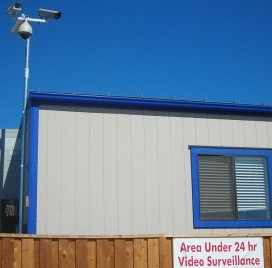 Equipment theft is big business with estimates topping a billion dollars a year which doesn’t even begin to include small tools or material theft. Most understandably, the most common time is after a site closes down on Friday & before everyone shows up on Monday. For smaller jobs it generally isn’t an issue to load everything up, but for larger projects that really isn’t an option.
Equipment theft is big business with estimates topping a billion dollars a year which doesn’t even begin to include small tools or material theft. Most understandably, the most common time is after a site closes down on Friday & before everyone shows up on Monday. For smaller jobs it generally isn’t an issue to load everything up, but for larger projects that really isn’t an option.
The dreaded paperwork / inventory list:
Granted paperwork is not going to help you secure or deter theft, but if something should happen having this information handy can aid the police in retrieving it quickly. Your insurance company will also require the information which will aid in you getting the money quicker so you can replace said goods.
If you are a smaller company you may just need one master list of equipment over “X value” &/or insured. For larger companies with multiple sites, they may have a master list with separate sub lists for each site. The “X Value” varies based on company – some will inventory small tools while others only worry about items over a set value. The list should be up to date & include;
- Serial Numbers
- Model Number
- Original date of purchase
- Original cost including accessories
- A description of the equipment including color, any identifiable marks, & damage
- Current photographs of the equipment
- A daily record of where equipment is located while on job sites?
- Inventory small tools on a weekly basis?
Visual Deterrents:
- Paint or mark all your equipment in unique way? (Bright color, company name, etc.)
- Engrave, weld, or punch unique ID numbers in two places? (one obvious and one hidden)
- Post “No Trespassing” notices, video surveillance in place & notice advising all VIN numbers and serial numbers are recorded
- Store equipment & trailers in well-lit areas
- Chains & locks in place to disable usage (Update – great example in piece by Toyota Equipment for forklifts)
- Actual security guards patrolling &/or security cameras in place
Securing vehicles & drivable equipment:
- Remove keys & store in secured area (safe in job-site trailer?)
- Disable vehicles & larger equipment by removing spark plugs, battery, etc… (depends on area, in some cases just doing that on the weekend will be fine, while in others it might be best done every day)
- Consider installing anti-theft, anti-vandalism, and secondary locks devices (chains, steering wheel locks, locking caps for fuel, oil, panels for instruments)
- Consider alarm systems on the vehicles &/or a LoJack type theft recovery systems (you might need to leave the battery in for some of these)
Key Control:
From vehicles to even table saws many devices have removable keys & safety shutoffs which need to be secured for the night. If you are a small remodeler locking them in a toolbox is fine, while for larger companies a safe in a job site trailer might be preferred. With that said make sure you have a backup person that can access the keys if the first person gets sick, or is delayed. Basic key control should include;
- A record of the number of keys for each piece of equipment
- Sign in & out sheet for keys
- Verify that all keys for the equipment are collected at the end of the day
Other Tips & Tricks:
- Store small tools, attachments in a tool crib, job trailer, or other secured gang box
- Park vehicles or equipment to help prevent easy access to said storage areas while considering the ability for security or police to maneuver around & if a fire was to break out it wouldn’t automatically spread to the trailer (i.e. parking a bobcat with the attachment end a foot away from the door of a container )
- Using a crane – lift generators, tool boxes, etc… out of reach & disable the crane
- If there isn’t any well-lit areas consider installing temporary lighting
- Store all tools & equipment in a locked & fenced in area
- Notify police of schedules including if anyone will be there during weekends –
Funny story with the last point: One builder had done basically everything right which included removing the key from the bobcat, the battery, etc… but unfortunately didn’t inform the police that they would be in the area. No worries as the police did increase patrols and one weekend morning stopped by as they saw some men loading the bobcat on a trailer with winches.
Well as most keys are similar they happened to have one that would turn the ignition over but of course the machine wouldn’t start. So when questioned they showed the officer that the key worked & stated that they were there to pick it up & get it fixed for Monday… Fortunately for the contractor, the cop remembered enough about said individuals so they were able to recover the bobcat.
